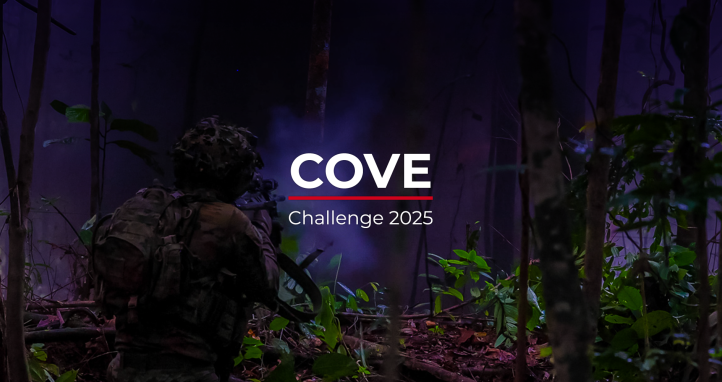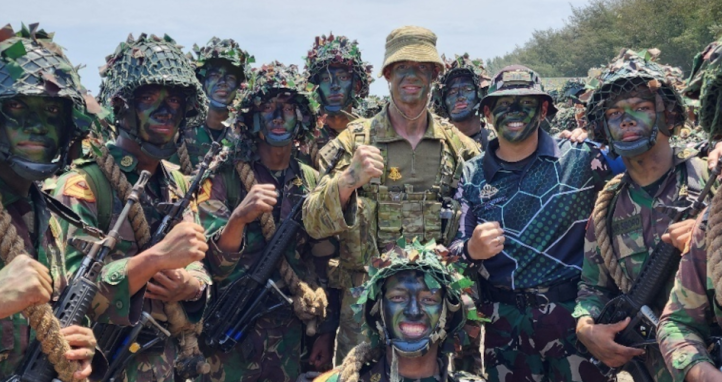The Kapooka (or 1 RTB) Chaplaincy team has been known to deal with a wide range of issues as thousands of Australians go through the initial transition from being a civilian to becoming a digger. In the first half of 2022 the Chaplaincy team provided approximately 171 mental health appraisals along with 446 Mental and Spiritual Wellbeing supports.[1] This was a 200% increase from previous years, with many trainees presenting or being referred with trauma related triggers – traumatic experiences ranged from domestic violence, sexual assault, refugees, homelessness, first-responders, and more recently pandemic related experiences.
As the ADF looks to expand its workforce, recognition has to be given to the fact that 75% of Australian adults have experienced a traumatic event. Many trauma survivors show major resilience, though most continue to live the struggles of physical, mental, and moral triggers. Nationally it is estimated that ill-mental health costs Australia $13 billion to $17 billion a year.[2] Veterans, with their own traumatic experiences, can develop a level of desensitisation that limits empathy and emotional expression after being soldiers who have been placed in potentially traumatic events on a regular and repeated basis.
This paper will explore questions from a training establishment (TE) perspective, particularly for recruit training in the range of programs conducted by 1st Recruit Training Battalion: how can our training culture re-traumatise rather than develop resilience? Can we prepare soldiers for potential re-traumatisation? What could trauma informed instruction look like for the Australian Army?
Re-traumatisation in training
It is necessary for Kapooka to be a place of “tough training”. As such it is normal and understandable for many individuals to struggle through their training. Trainees often express this through a sense of guilt and shame.[3] A significant amount of stress that recruits feel is self-originating; recruits are eager to succeed, recruits drive themselves for their staff’s affirmation, recruits feel like they are failing though passing assessments, the list goes on. Unfortunately, alongside this, even encouraging it, is the culture that staff have sometimes enforced around these activities; unexplained group punishment, lack of individualised feedback, derogatory language directed at recruits, and open lack of empathy.
From a moral perspective the distinction between “tough training” and “unacceptable behaviour” is the distinction between guilt and shame. Training becomes unacceptable when staff resort to evoking shame, often through abuse and control as a training tool. Generally, staff and recruits are not even aware of this dynamic and hence it has an unintentional nature, which I would argue is different from abusers who use behaviour to intentionally cause suffering and pain.
Historically there is a perceived gulf between civilian and soldier. This perception is reinforced organisationally by the incredibly short timeframe in which staff have to deliver training that inculcates an extensive set of skills and attitudes. This is felt as restrictive and overwhelming, for both staff and recruits. This in turn emphasises the pressure for staff to do whatever is takes to ensure recruits remain on pathway, resulting in the notion of Kapooka being a “sausage factory”. This gulf is then often emphasised by staff through the old narrative and belief that the recruit must be “broken down” first.
A recent observation, by the current Commandant, Colonel Andrew Deacon, CSM, was that perhaps this ideology echoes from a period of time during national service and conscription where individuals did not want to be soldiers. During such times it was necessary to “break down” that barrier. Now that individuals coming to Kapooka have volunteered and want to be soldiers in the Australian Army, there is arguably no need to break the recruit by use of activities that provide no direct training value.[4] This is particularly felt from recruits during group punishment when no specific reason is provided; such as when rooms are “tossed” while recruits are away and they are told their rooms were not at standard without the transgression clearly identified.
For survivors of trauma, particularly domestic violence, the current training environment becomes a re-traumatising event resulting in triggers that many resilient individuals have not experienced for a number of years. When a trainee does experience a trigger, often the response from staff can be to view this as not being resilient – a response that is born out of the pressure to keep people on pathway. To better understand this re-traumatising nature of the training environment it is possible to combine the Cycle of Violence with the Abuse and Control Wheel.

Outside is the cycle that recruits experience, which is not necessarily detrimental in itself. Control is a necessary element of the rank structure of the profession of arms, as defined by the Macquarie Dictionary, “to exercise restraint or direction over”; we call it command. When the cycle is interposed with the behaviours of abuse, re-traumatisation happens. It is not the fault of the trainee and most often not the intended action of the staff member.
Preparing for Trauma
Phoenix Australia, through their extensive research in Post-Traumatic Stress Disorder (PTSD) and more recently into moral injury, articulate the reality for high-risk industries: “Emergency services work inevitability brings with it exposure to potentially traumatic events that involve threats to your own life as well as exposure to the injury and death of others. …the cumulative strain of experiencing many different traumatic events means that some will experience ongoing difficulties.”[5] It’s widely accepted that the increased arousal triggers associated with PTSD, particularly being alert constantly and sensitive to danger, is lifesaving while on operations.
The tough training environment of the Australian Army is a key tool in preparing soldiers for potentially traumatic events while performing their duties. 1 RTB constantly seeks to maintain the seven principles for the conduct of tough training: 1. Realistic outcomes; 2. Methods to achieve defined levels of competence; 3. Graduated increases in training intensity; 4. Appropriately qualified personnel; 5. Development of training management plans; 6. Sufficient rest for mental and physical recovery; 7. Provision of counselling and guidance.[6] From a moral and welfare perspective the sixth and seventh principles are key to ensure that tough training doesn’t become detrimental and also that the training is developing, not re-traumatising, individuals. 1 RTB currently provides these two principles through low training days, local leave days, and through chaplaincy and mental health support.
The tough training culture of Kapooka echoes the “High Five Model of Psychological Preparedness” laid out by Emerging Minds.[7]

- Know the risks: trainees are introduced to the foundational elements of being a soldier, skills we hope they may never have to employ but they need to be prepared to if needed.
- Connect with others: trainees conduct training within platoons spending every moment with each other, performing simple duties to challenging tasks while emphasising the importance of teamwork during times of stress.
- Identify your strengths: trainees through character and leadership lessons are introduced to a range of tools through BattleSMART and character development, including reflection (journalling) and self-awareness as well as Emotional and Cultural Intelligence.
- Learn what to do in an emergency: trainees are exposed in a controlled environment supported by staff and specialists through ACP and high ropes as well as an escalation in training culminating in field environment.
- Look after your life: trainees are introduced to a pattern of life involving responsibility for their living accommodation, food, and physical health that emphasises self and others’ wellbeing and welfare through physical training and personal reflection time.
Greater attention has been given to the moral component of military power with the inclusion of the Australian Army Leadership Program – ALL (Lead Self). This inclusion into the character development component of training is done to enhance the physical and intellectual components in order for trainees to develop wholly from civilian to soldier. It helps individuals to understand the transformation they are going through and gives a sense of empowerment and control, as emphasised in trauma-informed care and practices.[8]
Trauma Informed Instruction
As we develop the physical and intellectual skills to be a professional instructor, attention to the moral skills will see the Australian Army have good instructors that are role models for the trainees to strive to become good soldiers. To achieve this there will always be the tension within the training space of time restraints, cost, and expected outputs. Madison Lang, while a cadet at Duntroon, pointed out the danger within the organisation of training “to reduce complex lessons into more easily understood moralisms”. This can establish damaging habits within the moral component that sets up trainees for failure in regard to ethical behaviour and moral courage.[9]
To mitigate against this potential failure and re-traumatisation there is an opportunity to explore a “Trauma Informed Instruction” that reinforces current best practice by adapting the core principles of Trauma Informed Care: safety, trustworthiness, choice, collaboration, empowerment, and respect for diversity.[10] This can be accomplished through improving training in moral language, domestic and family violence awareness, and emotional and cultural intelligence training.
More language, particularly around shame and guilt, is introduced at Kapooka through the character development lessons delivered by the Chaplaincy team. This could be enhanced through the provision of training around shame and guilt as well as staff being trained in the difference between control and abuse. This reflection is important for trainees as they are experiencing command for the first time in a professional workplace. Their reflection is often happening without any reference points to make sense of the tension they feel. Alongside this is domestic and family violence awareness, particularly for the staff in developing their language around violence within relationships. Though there may be an impulse to seek to have this provided through an online platform, this is one very important area where that would be unhelpful. Trauma informed instruction will almost always be at its best with reflection and engagement of required staff instructing face to face.
Alongside these two areas, which are external to the individual and almost for reference, emotional intelligence training provides the self-reflection necessary to understand the language and behaviours we use as well as our self-management in our professional relationships. The cultural intelligence can be critical in the self-reflection as we are seeking to understand how another person may perceive our language and behaviour, which can invite us to explore alternatives where appropriate.
There is a change happening within the staff of Kapooka with many platoon staff openly talking about “doing things better”. This is not to say all the staff of the past were abusers or perpetrators of unacceptable behaviour. The majority of staff have always been dedicated, committed to the recruits, and good instructors who are developing good soldiers. There is a lot that is has been done and is being done at 1 RTB that does not need to be changed or altered. The challenge is to enhance the understanding of trainees and staff awareness of the environment, context, and the complex backgrounds of the volunteers joining the profession of arms.




